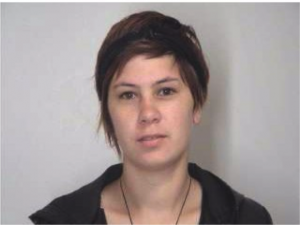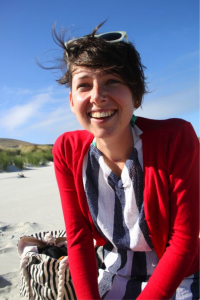Marsden Success for Dr Erica Newman
 This has been a great year for Dr Erica Newman whose research project, Journey Home: Descendants of Māori adoptees search for their tūrangawaewae, has been awarded a $300,000 Marsden Grant over three years. This is wonderful news for Te Tumu, who now have three staff undertaking Marsden-funded research.
This has been a great year for Dr Erica Newman whose research project, Journey Home: Descendants of Māori adoptees search for their tūrangawaewae, has been awarded a $300,000 Marsden Grant over three years. This is wonderful news for Te Tumu, who now have three staff undertaking Marsden-funded research.
Summary: Māori adoptees who have no knowledge of their Māori heritage pass the unknown to their descendants. Focusing on these descendants, this project will explore; how they identify with their taha Māori, avenues they have taken to connect to their taha Māori, and how they are accepted by their whānau and hapū. I will follow participants on their journey of discovery and will examine hapū membership eligibility. Oral narratives will be the primary base for this project with published and unpublished sources used to support and highlight issues the participants encounter. This will begin a new area of research that will highlight the issues of transracial adoption on identity and well-being for descendants of Māori adoptees in Aotearoa New Zealand. [Advisor: Associate Professor Angela Wanhalla.]
Erica was also one of the award winners featured by the Royal Society Te Aparangi.
For the complete list of 2020 Marsden grant awards, click here.
Recent Te Tumu theses
Te Tumu had a number of its students honoured at the university’s recent Graduation, including several doing post-graduate research.
Samantha Jackson, “Ko Te Houhanga a Rongo marae tōku tūrangawaewae: In search of a philosophical standing place for indigenous development”, (MA Indigenous Development).
Supervisors: Professor Grant Gillett, Associate Professor Merata Kawharu, Dr. Paerau Warbrick
Abstract: Dominant paradigms of development assume a linear progression from one established point to another. These paradigms do not take into account the complexity of indigenous voice, spirit and ways of being-in-the-world, leaving indigenous peoples without a meaningful place to stand. To approach the question of indigenous development in such a straight forward manner is a methodological error which stands to obscure meaningful indigenous development and silence the indigenous spirit.
In order to appropriately investigate the question of indigenous development, I argue we must awaken ourselves to our assumptions which form the background of how we view and understand ourselves, the world and others. I draw on Martin Heidegger’s interrogation of Cartesian thought to provide a space through which indigenous development can be meaningfully approached from a tangata whenua (Māori, people of the land) philosophical perspective.
I utilise the traditions and teachings of Reverend Māori Marsden to posit a meaningful model of indigenous development must be rooted in Te Ao Mārama traditions (Māori worldview), a woven universe of connection between self, ancestors, universe and gods. This idea is mooted in an international indigenous context, before returning to the traditions pertaining to Te Houhanga a Rongo marae (Māori cultural complex), my own tūrangawaewae (place to stand). I argue marae are a manifestation of Te Ao Mārama worldview and therefore an appropriate site to investigate indigenous development. I utilise whakapapa (genealogy) and kōrero pūrākau (stories of origin) as important mechanisms through which one can come to understand and organise the relationship between a person, their world and their gods. Maintaining an intimate relationship within the woven universe validates a person’s tūrangawaewae giving them the ‘sureness of touch’ of a person firmly rooted in belonging with unlimited potential for human development.
Nicole McCrossin, “Intention and Implementation: Piecing Together Provisions for Māori in the Resource Management Act 1991″, (MA, Indigenous Development)
Supervisors: Dr Janet Stephenson and Dr Jenny Bryant-Tokalau
Abstract: Today, it is widely recognised that indigenous people have a valuable contribution to make to the development and practice of resource management. New Zealand legislation recognises in part the importance of Māori participation; however, there appears to be a considerable gap between the recognition of these rights and their effective and widespread implementation at ground level. This study explores the intentions behind, and the implementation of Section 33 transfers of power and Sections 36B-E joint management agreements, under the Resource Management Act 1991, which support Māori participation in resource management decision-making. These provide for the devolution of power from local authorities to iwi authorities and the establishment of agreements to co-manage resources with iwi. A nationwide survey of local authorities’ use of the provisions demonstrated that they had been virtually unused. The majority of local authorities do not have any form of co-management agreements with Māori, and those that do have quite constrained arrangements which are designed to enhance consultation, rather than shared decision-making. The results of the survey are contrasted to findings from a series of semi-structured interviews with key informants involved in the crafting of the RMA, which examines the intentions behind the inclusion of these mechanisms in the legislation. The concept of institutional bricolage is used to help explain their creation and implementation, and the subsequent negotiation of the mechanisms and their alternatives by councils. The survey and interview results revealed that an intentional institutional bricolage approach was frequently employed by councils and iwi to negotiate co-management arrangements, but was not used in the crafting of the RMA co-management provisions. Instead, the provisions were a result of unintentional institutional bricolage, drawing on a range of structural and social influences.



